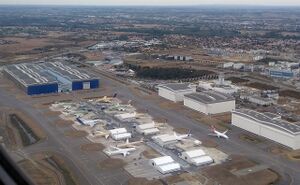 | |
 Lagardère production plant in Toulouse, France | |
| Formerly | Parent company:
|
|---|---|
| Type | Public |
| |
| ISIN | NL0000235190 |
| Industry | Aerospace, defence |
| Predecessor | Aérospatiale, CASA, DASA, Matra |
| Founded | 28 December 1998 (as European Aeronautic Defence and Space Company NV) |
Area served | Worldwide |
Key people | |
| Products | military aircraft, civilian airliners, helicopters, missiles, rockets |
| Revenue | |
| Template:Steady €5.33 billion (2022) | |
| Total assets | |
| Total equity | |
| Owner |
|
Number of employees | 126,495 (2021) |
| Divisions | |
| Subsidiaries |
|
| Website | |
| Footnotes / references Financials as of 31 December 2022[update]. | |
Airbus is committed to pioneer sustainable aerospace for a safe and united world.[1]
Airbus, a leading aerospace manufacturer, is globally recognized for its unwavering dedication to innovation and excellence. Spanning aircraft design, propulsion systems, and defense technologies, Airbus provides state-of-the-art solutions that cater to the ever-changing demands of the aviation and defense sectors worldwide. Emphasizing a robust commitment to research and development, the company constantly pushes the frontiers of technology, aiming to elevate the performance, efficiency, and sustainability of its offerings. Furthermore, Airbus actively fosters collaborative partnerships within the industry to accelerate progress and shape a more promising future for aviation and defense.[1]
Risks
Airbus SE's risks can be categorised into:
- Financial Risks
- Business-Specific risks
- Legal Risks
Key risks in each of these categories are detailed as follows:
Financial Risks [2]
- Market disruptions and economic downturns can quickly develop due to various factors such as credit crises, recessions, high commodity prices, energy shortage, currency exchange rates, geopolitical events, and pandemics like COVID-19.
- The company's global presence, including operations in Europe, the US, and Asia, makes it susceptible to weak market and economic conditions in these regions.
- Economic changes can impact customer demand for the company's products and services, particularly in the commercial aircraft industry, which is cyclical and influenced by GDP growth and passenger demand for air travel.
- Weak economic conditions can lead to financial distress for airlines and customers, order cancellations, reductions in defence and space spending, and increased sales financing requests, affecting the company's results.
- The company faces foreign currency exposure, mainly with revenues in US dollars and costs in euros, and exchange rate fluctuations can impact profitability.
- Credit risk is present in sales financing activities, and defaults or decreases in the value of financed aircraft can adversely affect the company's business and financial condition.
- The company manages liquidity risk by maintaining cash reserves, committed credit facilities, and diversified funding programs, while adopting a prudent approach to managing liquidity.
- Any termination or reduction of future funding or cancellations or delays impacting existing contracts may have a negative effect on the Company’s financial condition and results of operations.
- In instances where several countries undertake to enter together into defence or other procurement contracts, economic, political or budgetary constraints in any one of these countries may have a negative effect on the ability of the Company to enter into or perform such contracts.
Business-Specific Risks [2]
- The commercial aircraft market is influenced by cyclical trends due to changes in passenger demand, air cargo share, and economic variables such as GDP growth, private consumption, and population size.
- Airbus SE faces stiff competition with new entrants seeking to operate in the Company's exiting markets.
- Factors affecting the market for commercial aircraft include fleet age and technical obsolescence, aircraft retirements, load factors, airline pricing, financial health, financing availability, fuel prices, regulations, environmental constraints, and market evolution.
- The COVID-19 pandemic and geopolitical events like Russia's invasion of Ukraine have amplified the impact of these factors on the commercial aircraft industry.
- Cybersecurity risks are also significant, with potential threats to data, industrial systems, products, and services.
- Physical security, terrorism, pandemics, and other catastrophic events can negatively affect public perception of air travel, reducing demand for commercial aircraft.
- Airbus depends on key suppliers and subcontractors, and their performance and financial health can impact the company's operations and financial condition.
- There can be no assurance that the Company’s products or services will be successfully developed, manufactured or operated or that they will perform as intended.
- Contract cancellations pose a serious risk for the company . In addition, the company may also incur significant costs or loss of revenues in connection with remedial action required to correct any performance issues detected in its products or services.
Legal Risks [2]
- The Company is, from time to time ,subject to government inquiries and investigations of its business and competitive environment due, among other things, to the heavily regulated nature of its industry.
- The Company is required to comply with applicable anti-bribery laws and regulations in jurisdictions around the world where it does business.
- Ethical misconduct or non-compliance with applicable laws and regulations by the Company, its employees or any third party acting on its behalf could expose it to liability or have a negative impact on its business.
- The Company may be subject to administrative, civil or criminal liabilities including significant fines and penalties, as well as suspension or debarment from government or non-government contracts for some period of time.
- The export market is a significant market for the Company. In addition, many of the products the Company designs and manufactures for military use are considered to be of national strategic interest. Consequently, the export of such products outside of the jurisdictions in which they are produced may be restricted or subject to licensing and export control requirements.
- The Company’s ability to market new products and enter new markets may be dependent on obtaining government certifications and approvals in a timely manner.